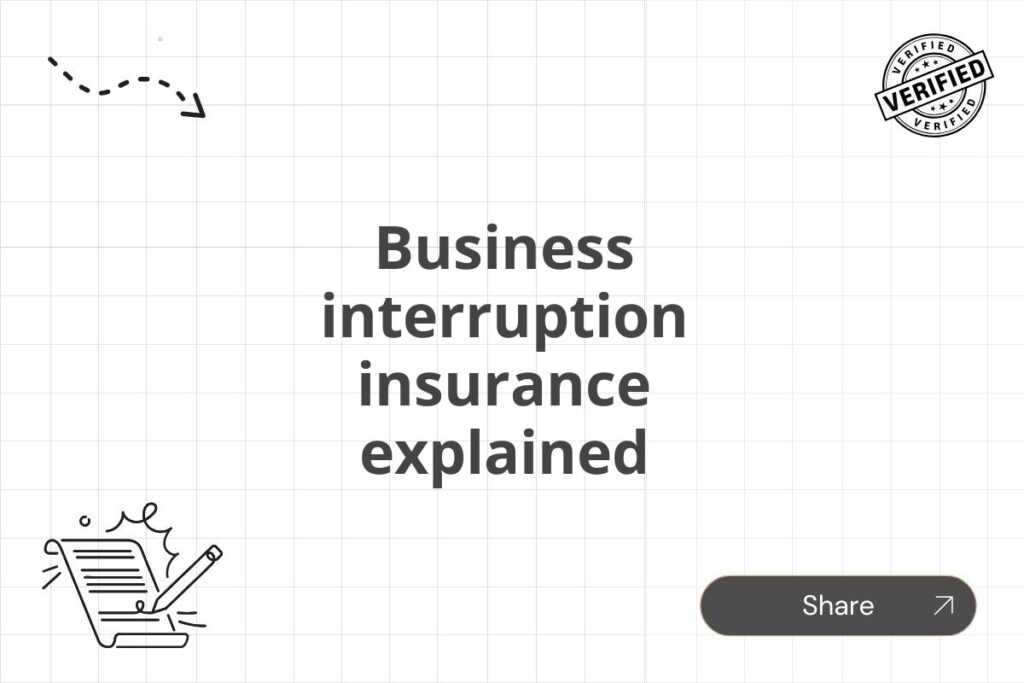Meta Description: Understand Business Interruption Insurance! This comprehensive guide explains coverage, claims, and how it protects your business from unforeseen disruptions, ensuring financial stability during challenging times. Learn the essentials today.
Business interruption insurance, often abbreviated as BI insurance, is a crucial component of a robust risk management strategy for any business, regardless of size or industry. It provides financial protection against losses incurred when your business is unable to operate normally due to unforeseen circumstances. While many associate insurance with property damage, BI insurance goes beyond that, safeguarding your income stream and operational capacity even when physical assets remain intact. This comprehensive guide will delve into the intricacies of business interruption insurance, explaining what it covers, how it works, and why it’s a vital investment for your company’s long-term health.
What is Business Interruption Insurance?
Business interruption insurance compensates businesses for lost income and expenses resulting from disruptions to their normal operations. These disruptions can stem from a wide range of events, including natural disasters (hurricanes, floods, earthquakes), fires, accidents, power outages, acts of terrorism, and even cyberattacks. The key is that the interruption doesn’t necessarily require physical damage to your property; the inability to operate normally is the trigger for the coverage.
Unlike property insurance that covers the cost of repairing or replacing damaged assets, BI insurance focuses on the financial consequences of the inability to operate. This includes lost revenue, continuing operating expenses (like rent, salaries, and loan payments), and extra expenses incurred to get back up and running.
What Does Business Interruption Insurance Cover?
The specific coverage offered by BI insurance policies varies widely depending on the insurer and the policy’s terms. However, common areas of coverage include:
- Loss of income: This covers the reduction in revenue caused by the business interruption.
- Continuing expenses: This helps cover ongoing business costs, such as salaries, rent, utilities, and loan repayments, even when no income is being generated.
- Extra expenses: This covers additional costs incurred to resume operations, such as renting temporary facilities, hiring temporary staff, or expedited repairs.
- Contingency planning: Some policies may offer coverage for the costs associated with developing and implementing contingency plans to mitigate future disruptions.
- Spoilage of goods: In certain industries, coverage may extend to the spoilage of perishable goods due to power outages or other disruptions.
It’s crucial to carefully review your policy wording to understand the specific inclusions and exclusions. Some policies may have sub-limits on certain types of coverage, or exclude certain types of disruptions altogether.
How Does Business Interruption Insurance Work?
The process of claiming under a business interruption insurance policy generally involves the following steps:
- Notification: Immediately notify your insurer of the event that caused the business interruption. The sooner you report the incident, the smoother the claims process will be.
- Investigation: The insurer will conduct an investigation to determine the cause of the interruption and assess the extent of the damage and the resulting business losses.
- Documentation: You’ll need to provide comprehensive documentation, including financial records, contracts, invoices, and any other relevant evidence to support your claim. This demonstrates the extent of your losses.
- Assessment: The insurer will assess your claim and determine the amount of compensation you are entitled to based on your policy terms and the evidence provided.
- Payment: Once the claim is approved, the insurer will make a payment to compensate for your losses.
The time it takes to process a business interruption claim can vary depending on the complexity of the case and the insurer’s procedures. It’s essential to maintain thorough records and cooperate fully with the insurer throughout the process.
Who Needs Business Interruption Insurance?
While the need for BI insurance is dependent on individual circumstances, many businesses would significantly benefit from this type of protection. Businesses that rely heavily on consistent operations or those with high operating costs are particularly vulnerable to significant financial losses from interruption. Consider these examples:
- Restaurants and hotels: These businesses rely on daily operations and suffer immediate financial consequences from closures due to unforeseen events.
- Manufacturers: Production interruptions can lead to significant losses in revenue and increased costs.
- Retailers: Disruptions to operations can affect sales and inventory management.
- Technology companies: Cyberattacks and system failures can cause significant operational downtime and financial losses.
- Small businesses: Small businesses often lack the financial reserves to withstand prolonged interruptions, making BI insurance essential.
Choosing the Right Business Interruption Insurance Policy
Selecting the appropriate BI insurance policy requires careful consideration of your business’s specific needs and risk profile. Here are some key factors to consider:
- Coverage limits: Determine the appropriate coverage amount to adequately protect your business from potential losses.
- Policy exclusions: Understand the events or circumstances that are not covered by the policy.
- Waiting period: This is the period of time after the interruption begins before coverage kicks in. Shorter waiting periods are generally preferable.
- Indemnity period: This is the period of time for which the insurance will provide coverage. Ensure the indemnity period is sufficient to cover the potential duration of your recovery.
- Insurer reputation: Choose a reputable and financially stable insurer to ensure that your claims will be handled efficiently and fairly.
The Importance of Proactive Risk Management
Business interruption insurance is a crucial element of a comprehensive risk management strategy. While the insurance provides financial protection, it’s equally important to implement proactive measures to minimize the likelihood and impact of disruptions. This might include:
- Developing a business continuity plan: Outline procedures for responding to various disruptions, including communication protocols, alternative operational strategies, and data backup procedures.
- Regular maintenance and preventative measures: Preventative maintenance on equipment and facilities can reduce the risk of breakdowns and malfunctions.
- Cybersecurity measures: Implementing robust cybersecurity protocols can minimize the risk of cyberattacks and data breaches.
- Employee training: Train employees on safety procedures and emergency response protocols.
Conclusion
Business interruption insurance is an investment that can safeguard your business’s financial stability during challenging times. While it doesn’t eliminate the risk of disruptions, it provides a critical safety net, allowing your business to recover and continue operating even after unforeseen events. By understanding the intricacies of this type of insurance and proactively managing your risks, you can significantly strengthen your business’s resilience and long-term success. Remember to consult with an insurance professional to determine the best policy to fit your specific needs and ensure you have adequate protection in place.






















